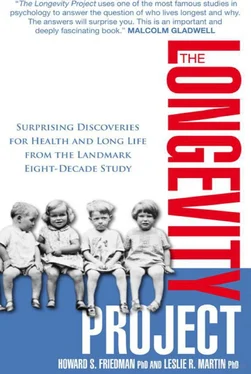At this point, we knew that something complicated was going on: there are positive aspects of being cheerful and happy, but there are negative, threatening aspects as well. We burrowed deeper into the matter, probing both the later lives of the Terman participants and the relevant research of other investigators.
The Tinker Bell Principle
The idea that optimism and good cheer are the secret to health is especially appealing to those who are ill. The more serious and challenging the disease, the more we hope for a mind-to-body effect in which good thoughts yield vigor and vitality. We have named this the Tinker Bell Principle, after the character in Peter Pan whose survival depends on enough people believing in fairies.
There is certainly good evidence for what is sometimes called mind over matter, when it involves focusing your attention on other things to cope with pain or minor troubles. But could optimism actually shrink a tumor or open a clogged artery? And if so, how can we increase our optimism?
One strategy for promoting or reinforcing optimism in sick persons is to give them placebos. Sugar pills, “magnetic” therapy, and even going to exorcists do “work” sometimes. 18 18 Anne Harrington provides a relevant history of mind-body matters in The Cure Within: A History of Mind-Body Medicine (New York: W. W. Norton, 2008).
In fact, they often work well (even in controlled scientific studies) for about one-third of people, especially when the problem is pain or a test of endurance in the face of a difficult treatment. As we noted, the more challenging question is whether optimism and placebos can help cure those with serious diseases.
Being optimistic or believing in a placebo treatment does affect the body’s physiology to some extent, but there is little firm evidence that this in itself will rev up the immune system enough to provide miracle cures. Instead, one clue to placebo effectiveness lies in the fact that optimistic people expect that their futures will be full of positive outcomes—that their labors will work out for the best. This means that optimistic people are more willing to persist in their efforts and stick with their goals, even when they encounter obstacles or adversity. If their families are likewise optimistic, so much the better. It’s easy to imagine how this attitude would help someone facing a complex prescribed medical regimen, a painful rehabilitation, or chemotherapy.
In other words, the main impact of optimism on health is that it encourages health-promoting behaviors. For someone who is seriously ill, this might mean an extra push to drink some water and get out of bed. For someone facing a chronic condition like HIV, it might mean taking all those pills on time, cutting out alcohol, or seeing the best doctors one can possibly find. Optimists like Paul are generally better at coping with challenges in the short term, a trait that can help one through a medical emergency. For example, Paul’s successful battle with pneumonia when he was forty-two was seemingly aided by the optimistic belief that he would surely recover—which encouraged him to stick with the regimen his doctor recommended, including uncomfortable and tedious breathing exercises.
Furthermore, if patients feel reassured after getting a placebo treatment, they’re more likely to sleep and eat better. Their stress levels will be lower and their bodies will have a better shot at reestablishing inner balance. Even if poor nutrition or stress weren’t the root cause of the illness, an optimistic motivation could provide the needed impetus for corrective actions.
However, the long-term effects of high levels of optimism (and cheerfulness) are not necessarily beneficial. If you are facing serious surgery and a long recovery, then realistic optimism is good. It may enable you to get on your feet faster and go home from the hospital sooner. But too much optimism can leave you surprised, disappointed, and seriously frustrated with any unexpected long-term hardships. Moderate worriers would actually do better in such situations—more on that later.
Tinker Bell recovers, but unfortunately we see no good evidence for the pure and simple form of this approach—that if you and your supportive friends think good thoughts, you’ll thereby get better. There is some evidence for a more sophisticated version of this idea, though, in which people who are optimistic at the right times and to the right degree will remain healthier and live longer.
In a bit we’ll explain how we uncovered a helpful role for worrying.
Illusory Optimism and Those Most Senior of Citizens
A significant health downside to optimism involves overlooking or ignoring real threats—sometimes called illusory optimism. Optimistic people, like happy people, may underestimate risks to their health and thereby fail to take precautions or to follow medical advice. The same optimistic thoughts that may promote recovery from surgery (“I’m going to be just fine”) may prove deadly to a cigarette smoker, a hypertensive, or an overeater.
Or, optimistic people may be especially shocked when things turn out badly. So they experience additional stress in the face of a job loss, a death in the family, or the return of cancer. Not only that, but they may then resume life-threatening habits. 19 19 The average person tends to rate his or her risk as below average. For further discussion of related matters, see N. D. Weinstein, “Exploring the Links between Risk Perceptions and Preventive Health Behavior,” in Social Psychological Foundations of Health and Illness , ed. J. Suls and K. Wallston, 22-53 (Oxford, England: Blackwell, 2003).
But don’t the oldest of the old, in the most golden of the golden years, tend to have a positive outlook? Studies of centenarians do find that long-lived people are optimistic. But this line of research has a serious flaw: there’s no proper comparison group. People who live to be one hundred have an affirmative view on life, but compared to whom? Maybe it was the grouches at age fifty who, after thriving for another half century, became the centenarians with the positive outlook. In fact, who wouldn’t feel rosy in front of a birthday cake aglow with one hundred candles?
This flaw in the centenarian research helps explain why so many of the findings of past studies on the secrets to longevity rarely hold up. Eat all the yogurt you can stand, and you are still very unlikely to reach a hundred. In our analyses of the Terman participants, we do look at those who reached extreme old age, but we do so in the context of their full lives, from childhood on. And in fact, studies (by other scientists) on mood and aging find that as adults get older, they generally are happier and experience fewer negative emotions. 20 20 For a study of aging and positive feelings, see M. Mather and L. Carstensen, “Aging and Motivated Cognition: The Positivity Effect in Attention and Memory,” Trends in Cognitive Sciences 9 (2005): 496-502.
The oldest among us are happy, but the happiness did not cause their long lives.
Would other research projects confirm this line of thinking? Aside from Dr. Terman’s project, there are only a few other excellent studies capable of looking at these matters of happiness and health in the proper way. One of the best is the Harvard Study of Adult Development, which has followed about 250 men since they were in college at Harvard in the 1930s. This study has found that men who coped with life’s challenges in a mature manner and maintained deep social relationships fared best. These men tended to have stable marriages and healthy habits (avoiding smoking and alcohol abuse and staying trim). Especially relevant to our own work on happiness and health is one of the most insightful conclusions by the head investigator of the Harvard study, Dr. George Vaillant, who contrasts the “Happy-Well” with the “Sad-Sick.” 21 21 You can read more about Dr. Vaillant’s study of the Harvard men in G. E. Vaillant, Aging Well: Surprising Guideposts to a Happier Life from the Landmark Harvard Study of Adult Development (Boston: Little, Brown, 2002).
Some paths led the Harvard men to be happy and well while other paths led to being sad and sick. Happiness was not the cause of wellness. Sadness was not the cause of sickness. Instead, Vaillant concluded, happiness or sadness was an outcome , just as was wellness or sickness.
Читать дальше











